Related Research Articles
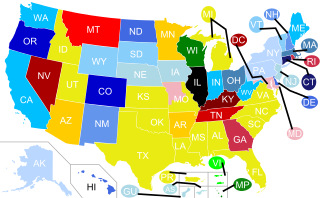
The United States has inherited sodomy laws which constitutionally outlawed a variety of sexual acts that are deemed to be illegal, illicit, unlawful, unnatural and/or immoral from the colonial-era based laws in the 17th century. While they often targeted sexual acts between persons of the same sex, many sodomy-related statutes employed definitions broad enough to outlaw certain sexual acts between persons of different sexes, in some cases even including acts between married persons.

Proposition 22 was a law enacted by California voters in March 2000 stating that marriage was between one man and one woman. In November 2008, Proposition 8 was also passed by voters, again only allowing marriage between one man and one woman.
Same-sex marriage has been legally recognized in New Jersey since October 21, 2013, the effective date of a trial court ruling invalidating the state's restriction of marriage to persons of different sexes. In September 2013, Mary C. Jacobson, Assignment Judge of the Mercer Vicinage of the Superior Court, ruled that as a result of the U.S. Supreme Court's June 2013 decision in United States v. Windsor, the Constitution of New Jersey requires the state to recognize same-sex marriages. The Windsor decision held that the federal government was required to provide the same benefits to same-sex couples who were married under state law as to other married couples. Therefore, the state court reasoned in Garden State Equality v. Dow that, because same-sex couples in New Jersey were limited to civil unions, which are not recognized as marriages under federal law, the state must permit civil marriage for same-sex couples. This ruling, in turn, relied on the 2006 decision of the New Jersey Supreme Court in Lewis v. Harris that the state was constitutionally required to afford the rights and benefits of marriage to same-sex couples. The Supreme Court had ordered the New Jersey Legislature to correct the constitutional violation, by permitting either same-sex marriage or civil unions with all the rights and benefits of marriage, within 180 days. In response, it passed a bill to legalize civil unions on December 21, 2006, which became effective on February 19, 2007.

In the United States, speed limits are set by each state or territory. States have also allowed counties and municipalities to enact typically lower limits. Highway speed limits can range from an urban low of 25 mph (40 km/h) to a rural high of 85 mph (137 km/h). Speed limits are typically posted in increments of five miles per hour (8 km/h). Some states have lower limits for trucks, some also have night and/or minimum speed limits.
In response to court action in a number of states, the United States federal government and a number of state legislatures passed or attempted to pass legislation either prohibiting or allowing same-sex marriage or other types of same-sex unions.

This article summarizes the same-sex marriage laws of states in the United States. Via the case Obergefell v. Hodges on June 26, 2015, the Supreme Court of the United States legalized same-sex marriage in a decision that applies nationwide, with the exception of American Samoa and sovereign tribal nations.

Proposition 2 was a referendum for a state constitutional amendment placed on the ballot by the Texas legislature and approved by the voters at the November 8, 2005 general election. The measure added a new provision to the Texas Constitution, Article 1, Section 32, which provides that "Marriage in this state shall consist only of the union of one man and one woman", and "This state or a political subdivision of this state may not create or recognize any legal status identical or similar to marriage." Texas thus became the nineteenth US state to adopt constitutional amendment banning same-sex marriage. It was the most populous state to adopt a constitutional ban on same-sex marriage until California passed its ban in November 2008. The amendment was later invalidated in June 2015 after the Supreme Court legalized same-sex marriage nationwide in the Obergefell v. Hodges decision, though the amendment remains in the Texas Constitution.
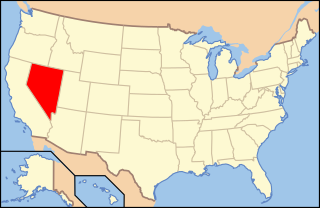
Lesbian, gay, bisexual, transgender, and queer (LGBTQ) people in the U.S. state of Nevada enjoy the same rights as non-LGBTQ people. Same-sex marriage has been legal since October 8, 2014, due to the federal Ninth Circuit Court of Appeals ruling in Sevcik v. Sandoval. Same-sex couples may also enter a domestic partnership status that provides many of the same rights and responsibilities as marriage. However, domestic partners lack the same rights to medical coverage as their married counterparts and their parental rights are not as well defined. Same-sex couples are also allowed to adopt, and state law prohibits unfair discrimination on the basis of sexual orientation and gender identity, among other categories, in employment, housing and public accommodations. In addition, conversion therapy on minors is outlawed in the state.
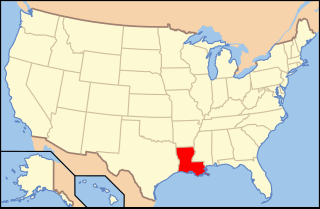
Lesbian, gay, bisexual, transgender, and queer (LGBTQ) people in the U.S. state of Louisiana may face some legal challenges not experienced by non-LGBTQ residents. Same-sex sexual activity is legal in Louisiana as a result of the U.S. Supreme Court decision in Lawrence v. Texas. Same-sex marriage has been recognized in the state since June 2015 as a result of the Supreme Court's decision in Obergefell v. Hodges.
Same-sex marriage has been legal in Arizona since October 17, 2014. The U.S. state had denied marriage rights to same-sex couples by statute since 1996 and by an amendment to its State Constitution approved by voters in 2008. On October 17, Judge John W. Sedwick ruled in two lawsuits that Arizona's ban on same-sex marriage was unconstitutional, and enjoined the state from enforcing its ban, effective immediately. Attorney General Tom Horne said the state would not appeal that ruling, and instructed county clerks to comply and issue marriage licenses to same-sex couples.
Same-sex marriage has been legally recognized in Pennsylvania since May 20, 2014, when a U.S. federal district court judge ruled that the state's 1996 statutory ban on recognizing same-sex marriage was unconstitutional. Governor Tom Corbett announced the following day that he would not appeal the decision. Pennsylvania had previously prohibited the recognition of same-sex marriage by statute since 1996, but had never added such a ban to its State Constitution.
Same-sex marriage has been legally recognized in Indiana since October 6, 2014. The state had previously restricted marriage to different-sex couples by statute in 1986. Legislation passed in 1997 denied recognition to same-sex relationships established in other jurisdictions. A lawsuit challenging the state's refusal to grant marriage licenses to same-sex couples, Baskin v. Bogan, won a favorable ruling from the U.S. District Court for the Southern District of Indiana on June 25, 2014. Until the Seventh Circuit Court of Appeals granted an emergency stay of the district court's ruling on June 27, most Indiana counties issued marriage licenses to same-sex couples. The Seventh Circuit affirmed the district court's ruling in Baskin on September 4. A ruling in Bowling v. Pence stated that the state must recognize same-sex marriages performed out-of-state and the decision was stayed until the Seventh Circuit ruled on the merits in similar cases. It also stated that the ruling would remain stayed if the circuit court stayed its decision in the related cases.
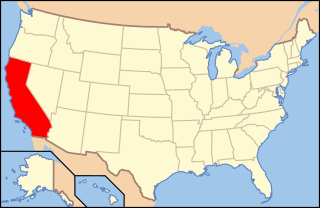
California is seen as one of the most liberal states in the U.S. in regard to lesbian, gay, bisexual, transgender, and queer (LGBTQ) rights, which have received nationwide recognition since the 1970s. Same-sex sexual activity has been legal in the state since 1976. Discrimination protections regarding sexual orientation and gender identity or expression were adopted statewide in 2003. Transgender people are also permitted to change their legal gender on official documents without any medical interventions, and mental health providers are prohibited from engaging in conversion therapy on minors.

The establishment of lesbian, gay, bisexual, transgender, and queer (LGBTQ) rights in the U.S. state of Connecticut is a recent phenomenon, with most advances in LGBT rights taking place in the late 20th century and early 21st century. Connecticut was the second U.S. state to enact two major pieces of pro-LGBT legislation; the repeal of the sodomy law in 1971 and the legalization of same-sex marriage in 2008. State law bans unfair discrimination on the basis of sexual orientation and gender identity in employment, housing and public accommodations, and both conversion therapy and the gay panic defense are outlawed in the state.

Lesbian, gay, bisexual, transgender, and queer (LGBTQ) people in Texas have some protections in state law but may face legal and social challenges not faced by others. Same-sex sexual activity was decriminalized in Texas in 2003 by the Lawrence v. Texas ruling. On June 26, 2015, the Supreme Court of the United States ruled bans on same-sex marriage to be unconstitutional in Obergefell v. Hodges.
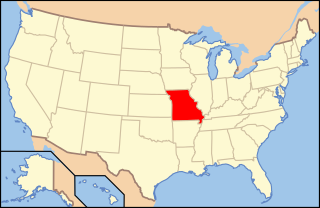
Lesbian, gay, bisexual, transgender, and queer (LGBTQ) people in the U.S. state of Missouri face some legal challenges not experienced by other residents throughout the state, excluding St. Louis, Kansas City, and Columbia. Same-sex sexual activity is legal in Missouri, in accordance with 2003's Lawrence v. Texas decision. In 2006, Missouri codified the legality of same-sex sexual activity into its statutory law.
The state of Texas, located in the south in the United States, contains a large community of LGBTQ+ citizens. More specifically, the city Austin, Texas has the third largest population of LGBTQ+ people based on the size of the city. Austin, Texas, and Texas in general, is home to several icons of the LGBTQ+ community such as Karamo Brown, co-founder of the LGBTQ+ group "Queer Eye" and Demi Lovato, a queer artist and activist. There is history of heavy violence against the LGBTQ+ community within Texas such as riots, as well as liberation and parades celebrating those within the community.

Gun laws in Texas regulate the sale, possession, and use of firearms and ammunition in the U.S. state of Texas.
The U.S. state of Texas issues marriage licenses to same-sex couples and recognizes those marriages when performed out-of-state. On June 26, 2015, the United States legalized same-sex marriage nationwide due to the U.S. Supreme Court's decision in Obergefell v. Hodges. Prior to the U.S. Supreme Court's ruling Article 1, Section 32, of the Texas Constitution provided that "Marriage in this state shall consist only of the union of one man and one woman," and "This state or a political subdivision of this state may not create or recognize any legal status identical or similar to marriage." This amendment and all related statutes have been ruled unconstitutional and unenforceable. Some cities and counties in the state recognize both same-sex and opposite-sex domestic partnerships.
Same-sex marriage has been legal in Texas since the U.S. Supreme Court's ruling in Obergefell v. Hodges on June 26, 2015. Previously, the U.S. state of Texas had banned same-sex marriage both by statute since 1973 and in its State Constitution since 2005. On February 26, 2014, Judge Orlando Luis Garcia of the U.S. District Court for the Western District of Texas found that Texas's ban on same-sex marriages was unconstitutional. On April 22, 2014, a state court came to the same conclusion. Both cases were appealed. The district court's decision was appealed to the Fifth Circuit Court of Appeals, but before that court could issue a ruling, the U.S. Supreme Court struck down all same-sex marriage bans in the United States in Obergefell on June 26, 2015. Within a few months of the court ruling, all counties had started issuing marriage licenses to same-sex couples, except for Irion County, which announced in 2020 that it would begin issuing licenses to same-sex couples, making it the last county in the United States to comply with the ruling.
References
- ↑ "Texas Family Code sec. 6.204". Statutes.legis.state.tx.us. Retrieved 2013-12-05.
- ↑ "Texas Family Code sec. 6.204(c)". Statutes.legis.state.tx.us. Retrieved 2013-12-05.
- ↑ Texas Governor's website